
Ravi Singh Bhalla was elected to the City Council in Hoboken, New Jersey this past week! A city that is less than 1% Asian and predominately white, Hobokens elected Bhalla with 5,810 votes. Bhalla had the highest number of votes amongst the 6 candidates competing for the 3 council seats.
In an e-mail out to supporters, Ravi’s brother, Amardeep Singh, described the bigotry they received during this campaign. He writes:
“… elections are not always for the faint of heart … we were cursed at constantly, literature was ripped out of our hands and stomped on, I was told by someone “I love killing Arabs”, and I was asked whether I “had a green card.”
Despite these attacks, the residents of Hoboken voted for Bhalla because he was a committed candidate who focused on the issues. Bhalla says, “It’s very humbling … it shows that people were focused on what a candidate brought to the table.”
 This past weekend Wal-Mart opened its first* Indian-based store in Amritsar, spreading its global brand to one of the fastest-growing markets in the world. As part of a larger strategy to develop a presence in India, this is the first of fifteen new stores that will open over the next few years. [source]
This past weekend Wal-Mart opened its first* Indian-based store in Amritsar, spreading its global brand to one of the fastest-growing markets in the world. As part of a larger strategy to develop a presence in India, this is the first of fifteen new stores that will open over the next few years. [source]
However, instead of targetting low-income consumers and discount shoppers, Wal-Mart India’s business model focuses on wholesales to small shop stand owners. This decision seems largely based in regional market dynamics. Wal-Mart does not think it can crowd out a market share against small dhabas and the like, and instead opts for wholesaling:
Mr. Singh and the more than 10 million other tiny retailers in India are Wal-Mart’s greatest challenge and greatest opportunity. If it can win them over, they are likely to become its biggest customers. Anger them and they could use their political power to block expansion.
Wal-Mart entered with nary a whisper or protest, despite years of vocal opposition to big-box stores in the past. The WSJ cites the slowing economy, but I wonder to what extent choosing Amritsar, as opposed to metro Mumbai or Delhi, indicates Wal-Mart’s desire to build a presence in transitional, recessionary regional economies.
 As talking heads buzzed with news of President Obama’s nomination of Sonia Sotomayor to the Supreme Court, there has also been a flurry of commentary. Is her selection tokenizing? Is it triumphant? Is she smart enough? Is she nice enough? I don’t think it’s particularly useful to parse the commentary on Judge Sotomayor specifically — a lot of the back and forth parallels and reproduces the tropes that come out in any discussion addressing privilege and remediation.
As talking heads buzzed with news of President Obama’s nomination of Sonia Sotomayor to the Supreme Court, there has also been a flurry of commentary. Is her selection tokenizing? Is it triumphant? Is she smart enough? Is she nice enough? I don’t think it’s particularly useful to parse the commentary on Judge Sotomayor specifically — a lot of the back and forth parallels and reproduces the tropes that come out in any discussion addressing privilege and remediation.
The same day, a relatively lengthy commentary previewed on NPR’s morning edition. It argued that while Obama’s nomination was a triumph (if successful, Sotomayor will be the first woman of color and first Latina on the Court), the President should examine other forms of diversity on the bench. Specifically, he should appoint an LGBT Justice, next.
 At the Langar Hall, we’ve covered a number of Sikh candidates’ campaigns for local government office. I just wanted to include a brief update about Ravi Bhalla, who looks poised to become one of Hoboken’s first Sikh city councilmembers as he enters a run-off election next month:
At the Langar Hall, we’ve covered a number of Sikh candidates’ campaigns for local government office. I just wanted to include a brief update about Ravi Bhalla, who looks poised to become one of Hoboken’s first Sikh city councilmembers as he enters a run-off election next month:
While it is clear that Peter Cammarano and Dawn Zimmer will vie for the Hoboken mayoralty on June 9, the provisional ballots may still change the neck-and-neck race to see which of the last three of six council-at-large candidates get into the runoff on that date. […]
As of Tuesday night, it looked like the top six will be as follows:
[1.] Carol Marsh 3,719
[2.] Ravi Bhalla 3,698
[3.] Dave Mello 3,361 [link]
When we last covered this story, Ravi was running as an independent for office. Since then, he joined a “reform” slate and has been campaigning extensively. His success comes as a surprise to some, who don’t understand how a practicing Sikh could get so far…
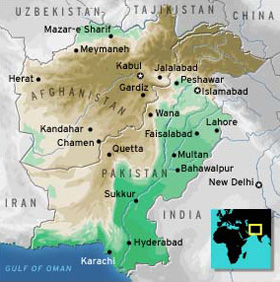
There were two blurbs in the news this week regarding the ethnic cleansing of Sikhs from Pakistan’s tribal regions along the Afghani border [full disclaimer: both stories are from the Indian press, so there is certainly a different political interest/stake in representing Pakistan as a state with anti-minority insurgency]:
Terming the Taliban as “ruthless killers,” the US today said the action initiated by them against the minority Sikh community in Pakistan’s tribal region was not surprising provides all the more reason to rid the region of extremists.
“I’ve heard reports about that. It doesn’t surprise me. I mean, these are ruthless killers, the Taliban,” State Department spokesman Robert Wood told reporters at his daily press briefing when asked about Taliban’s demand for “Jizya” from Sikhs in Pakistan’s tribal regions forcing them to leave their homes. [link]
India has taken up with Pakistan the issue of treatment of minorities following reports of demolition of Sikhs’ homes in parts of the country. [link]
I fully appreciate the irony of India calling for Pakistan to pay attention to the violent removal of minorities from their homes, and the spillover effects of the Taliban’s activities on the Pakistani border have been well-covered in the media. But this raises a larger question about more bald-faced attempts to crowd Sikhs and other religious minorities fully out of Pakistan. Sikhs already constitute a super thin minority with very little political power. Some would argue this should come as no surprise if people chose to remain within an Islamic Republic. Nonetheless, this additional pressure places an additional strain on minority communities who have negotiated remaining within Pakistan. Does this indicate Pakistan’s overall weakness in enforcing its border, or does it illustrate a political decision not to get involved while the Taliban capitalizes on underlying beliefs around minority groups? As this culture of intolerance moves east, is it the harbinger for a larger cultural shift within Pakistan? It certainly calls for the homogenization of the State, including forms of practice within Islam, but was this an interim sacrifice in order to preserve primacy for the central government?
More Sikh (or being promoted as Sikh) products are launching- I’m referring to the new tv channels: 1) The Sikh Channel– which is replacing Brit Hits TV and 2) Punjjabi TV…
Punjabi and Sikh people finally have the opportunity to watch programs in their mother tongue with the launch of a dedicated Sikh channel on Sky digital 840 and the perceived arrival of Punjjabi TV coming on air as early as Monday next week. [link]
Does this increase in Sikh products mean that Sikhs will have a platform and voice which we’ve been lacking before? Not necessarily. Zee Punjabi and many other channels have already been targeting Punjabi and Sikh audiences. So far it seems like these new channels will continue to provide the same coverage as earlier channels- sitcoms, kirtan, music, and some non-controversial news. There’s very little information available online about these channels thus far, and I’m interested to know whether they’re owned by Sikhs or just targeting a Sikh audience.
Regardless of the owners, the launch of these channels does signal that at least some parts of our community are gaining economic and social power, at least in the UK where these channels seem to be based. And perhaps (depending on who the owners are) these channels can serve as platforms for discussing ideas that other news forms avoid, out of a desire to remain non-controversial. Or perhaps it’ll be more of the same.
Updated: Friday, at 11:30PM
Last year we covered the story of a Sikh youth accused of brandishing his kirpan on the schoolyard. Accounts of the incident were hugely divergent; it was unclear whether an assault had ever actually occurred, or whether the report was a feature of animosity toward religious minorities in Quebec.
Yesterday that youth was fully acquitted of the kirpan-based charge, and his other possible charges were dispensed. The outcome of this case is a success for the youth involved, but also in that its outcome has no bearing on the interpretation or application of its effect to the kirpan in general. The judge in this case intimated that the case had gone too far and would never have been brought, were it not for the youth’s nationality and religious identity:
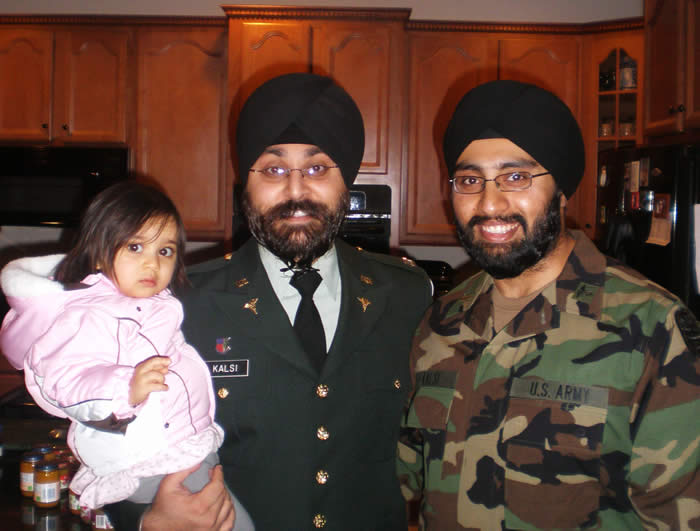
Sikhs Now: Kamaldeep Kalsi (L) and Tejdeep Rattan (R)
Two Sikh recruits in the U.S. Army, Kamaljeet Singh and Tejdeep Singh, were told they would be allowed to continue to wear their turbans as active members of the military. They describe this as being able to wear both their uniforms: that of a Sikh, and of a member of our Armed Forces. Now Army personnel have back-pedaled, claiming a 1981 ban prohibits soldiers from wearing “overt” articles of faith — including the dastar.
Despite a long history of Sikh participation in armed forces worldwide, Steve Levine, a former Army lawyer from 1992-1999, speculates that there are at least two policy reasons for requiring shorn hair: unit cohesion, and the ability to wear military equipment [link]. This seems incongruous given that Sikhs had served on active duty in the Army with full daris and dastars, and were perfectly well-protected, in the past. In light of previous exemptions, lawyers for these Sikhs argue the policy is an undue burden on the free excercise of faith under the Religious Freedom Restoration Act of 1993.
UPDATE: The 13-year old youth who was arrested that night has been charged with assault and is scheduled to appear in court on May 19. [source] Thanks to everyone who’s given more information in the comments!
———————————————————————————————————————————–
Some tragic news is coming out of Toronto tonight from the Dixie gurdwara’s Vaisakhi celebrations. 
A Mississauga teen was stabbed in the stomach and seriously injured Tuesday night during a [Vaisakhi] celebration at the Ontario Khalsa Darbar temple in Mississauga.
The 15-year-old male was taken to the Hospital for Sick Children in Toronto after the stabbing at around 10 p.m. in a kitchen in the temple’s basement. The victim was conscious and breathing, a Peel police officer said at the scene, and was believed to be in serious but not life-threatening condition.
Peel police arrested a teenager at the scene who is about the same age as the victim.
The stabbing happened during Vaisaki, an annual religious festival marking the start of the new solar years that, throughout the day, draws about 30,000 people to the temple, also known as Dixie Gurdwara. [link]
An equally young suspect is in custody, though no information about motive has been released yet. If any readers in Toronto can update us, your southern neighbors would really appreciate it.
A suspect, about the same age as the victim, is in police custody. Police say the knife used in the stabbing may have been set out with some food. [link]
I’ll refrain from speculating about possible motives since there is so little information to go on right now. What I can say at this point, regardless of the back story, is that there is no acceptable justification for this senseless act of violence.
I’ll update this entry as more information is released though. Our thoughts are with the young victim, his family, and Toronto’s sangat.
Well, it seems like the sex ratio in Punjab is not improving despite the number of trees Mrs. Badal is planting and the SGPC’s desire to raise unwanted girl children.
The Tribune reports:
In 2001, the census of India recorded Punjab’s sex ratio at 876 females for 1,000 males, one of the worst in the country. The preliminary findings of a Lucknow-based agency AMS engaged by the government to assess the current situation shows that sex-ratio in many districts of the state has plummeted further.
First, AMS’s study has called out the Punjab government’s bluff in data collection. Apparently, the data collected by Punjab government agencies painted “… an unbelievably rosy picture of the situation”. The Social Security Department and Health Department have reported two different results. These results also do not match those of AMS.
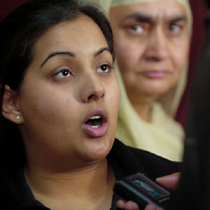
Tajinder (foreground) and Shalinder (background) Bansra.
Shalinder Kaur Basran is one of 19 recipients of the Carnegie Medal for heroism for intervening in a murderous domestic violence altercation in which a husband stabbed his wife. At the time, it was one of three cases in which desi-Canadian women had been killed by their families.
When Bibi Shalinder and her daughter heard a fight escalating downstairs, accompanied with cries for help, they ran downstairs where they found Jatinder Waraich had stabbed his wife, Navreet. She lay bleeding on the floor, crying for help. When he advanced on her, again, Bibi Shalinder forcibly removed him (while he held his knife) from the apartment while her daughter called 911. While police arrested Jatinder, his wife, unfortunately, did not survive his attack.
Reading about this award was really bittersweet for me. On one hand, I think interjecting yourself in the heat of a fight — with someone who’s already been acting crazy and is actively wielding a weapon — requires tremendous courage and strength. On the other hand, the underlying story of domestic violence and murder is heart-breaking. It made me wonder if others would have rushed to assist Navreet Waraich, or if they would have ignored it, assuming it was a domestic disagreement.
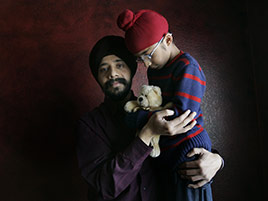 A couple of days ago Darshan Singh took his six-year-old son, Gurjot, to the post office to get a U.S. passport. Unfortunately, his experience is all too familiar: postal workers refused to take Gurjot’s photo, insisting he remove his “hat”:
A couple of days ago Darshan Singh took his six-year-old son, Gurjot, to the post office to get a U.S. passport. Unfortunately, his experience is all too familiar: postal workers refused to take Gurjot’s photo, insisting he remove his “hat”:
A Frisco father says his family’s trip to the post office turned into an emotional experience after a postal worker refused to take his son’s passport picture while the boy was wearing a turban…
“We kept telling them, ‘it’s not a hat,’” Singh said. “I want to make sure that doesn’t happen to any other kid of my religion.”

Canada’s problem with its Sikh minority should be of concern to Americans not just because Vancouver borders on the US, but for the broader lessons this story of ethnic conflict teaches. When a country imports an alien population, it often brings in all of the conflicts that bedeviled the immigrants in their homelands. Consequently, Western nations can get dragged into intractable conflicts that would otherwise be none of their business. Moreover, differences between the immigrant and host populations are likely to prove disruptive, even disastrous. Differences in history and culture pose difficulties enough, but most divisive are differences in nature. As long as we continue to ignore the possibility that there are biological differences among races that cause them to create different types of societies, we run the risk of importing populations that are prone to poverty and crime and hostile to white people and their values.
One could almost pity the plight of white supremacists these days. Their political influence has diminished greatly and their numbers are dwindling. A black man is the most powerful person in the world. Fearing public ostracization, they constantly have to ensure their words never betray their thoughts. In 2009, being a racist just isn’t cool anymore. But that hasn’t stopped this vocal minority from trying their best.
“White Pride” sites on the internet are full of rants against various ethnic and racial communities, blaming them for everything wrong with the world’s economic, social and political woes. Usually, its African Americans, Hispanics or Jews that are targeted. Now it looks like the Sikhs have caught their attention.
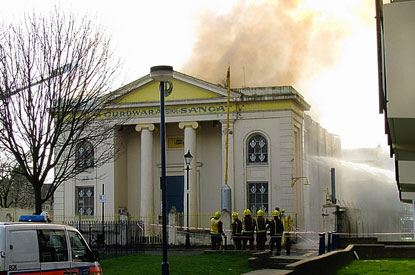 Recent news from East London is that Gurdwara Sikh Sangat has been substantially destroyed in an attempted arson attack. An official statement of the Executive Committee of the Gurdwara Sikh Sangat states that,
Recent news from East London is that Gurdwara Sikh Sangat has been substantially destroyed in an attempted arson attack. An official statement of the Executive Committee of the Gurdwara Sikh Sangat states that,
On Monday the 16th March 2009 at approximately 1.30pm, whilst some women were attending a Satsang a male person unknown to the worshipers entered the Temple through a side entrance. One of the worshipers came from the main hall and confronted the intruder coming down from the top floor and inquired why he was in the building. He replied that he had come to meet someone and then ran out.
Shortly after a fire was discovered coming from the top floor Sachkhand room (this room is where the Guru Grant Shaibs/holy books are kept) within the Temple complex. [link]
Most of the gurdwara’s roof has collapsed and the community fears that all but one of the Granth’s kept inside the gurdwara have been destroyed. The women who were in the gurdwara at the time were able to rescue one Granth from the flames, but unfortunately not the others.
“I can’t describe how important those holy books were to the Sikh community,” he added. Kulvinder Singh Virk, 26, who runs a local off-licence and is also a member of the temple, said: “This is very personal for us. It’s as if a member of our family has been burnt to death.” [link]
One worshipper said that in the past few weeks he had noticed racist graffiti on one of the gurdwara’s outer walls.
We’ve definitely covered stories on the trials and tribulations Sikhs have faced recently in Texas. I saw this and thought it would be nice to share what students at the University of Texas – Arlington are doing to help dispel ignorance around our faith community.
The line outside the University of Texas at Arlington’s library this week wasn’t for intramural sign-up, a spring break travel package or even hot dogs sold off the grill for a fraternity fundraiser.
The organizers structured the event to trade off gift cards for a promise to wear a turban for a few hours, and during that time, to refrain from smoking, drinking, etc. It was the SSA at Southern Methodist (SMU) that came over and hosted events at neighboring campuses, relying on donations and outreach to the Dallas/Ft. Worth Sikh community.
Turban-tying throughout the week had two purposes: to raise consciousness around Sikhi as a distinct faith, and to expose non-Sikhs to the lived experience of, and discrimination faced by, Sikhs in the U.S.
It only took Keith Jackson two hours to understand the heft of American bias felt by Sikhs. The 31-year-old heavy equipment operator noticed the crowd in front of the library and decided to don a navy turban and an “Ask Me Why I’m Wearing a Turban” button. Then he went to lunch at Subway.
One man asked Jackson’s colleague, who also wore a turban, if he was part of the Taliban. Another man told them that bin Laden was their big brother. Someone on a bike started screaming at them. Everyone stared.
While the coverage in the article is imperfect, I thought it showed an interesting willingness, and engagement, of members of the UTAr campus community to take on a different experience. Overall, though, it sounds like it was effective in opening the door for changing the discourse/reflection on how non-Sikhs interact with their Sikh neighbors.
 As International Women’s Day approaches us this weekend, I wanted to highlight the story of one woman who left a life of violence to a home of comfort built from creativity. Tanya Momi, a Bay Area South Asian woman from Chandigarh, is a painter and owner of “Spoil-Me Salon”, who left a long-term abusive marriage where she was treated like an “educated maid”. On March 8th her work will be launched in San Francisco as part of Amnesty International’s Stop Violence Against Women’s traveling art exhibit.
As International Women’s Day approaches us this weekend, I wanted to highlight the story of one woman who left a life of violence to a home of comfort built from creativity. Tanya Momi, a Bay Area South Asian woman from Chandigarh, is a painter and owner of “Spoil-Me Salon”, who left a long-term abusive marriage where she was treated like an “educated maid”. On March 8th her work will be launched in San Francisco as part of Amnesty International’s Stop Violence Against Women’s traveling art exhibit.
Vidya Pradhan writes:
“Tanya Momi rebuilt her life after a traumatic marriage and divorce and in her own quiet way she helps other women do the same. “Women come into my life through the salon,” she says. “They are like the missing puzzle pieces of my life.” Through her work in the salon and her paintings she reaches out to offer comforting messages of hope and renewal.”
 Assemblyman Warren Furutani (D-Long Beach) has introduced a new bill requiring awareness trainings and instruction on how to approach Sikhs for California’s law enforcement agencies and officers. If passed, California, which is home to the oldest Sikh gurdwara in the U.S. (Stockton) and one of the largest Sikh populations in the country, would take affirmative steps to ensure that the rhetoric around national security is not inappropriately utilized to prevent Sikhs from the free and fully practice of our faith.
Assemblyman Warren Furutani (D-Long Beach) has introduced a new bill requiring awareness trainings and instruction on how to approach Sikhs for California’s law enforcement agencies and officers. If passed, California, which is home to the oldest Sikh gurdwara in the U.S. (Stockton) and one of the largest Sikh populations in the country, would take affirmative steps to ensure that the rhetoric around national security is not inappropriately utilized to prevent Sikhs from the free and fully practice of our faith.
Assemblyman Furutani explained the need for this protection specifically in the context of the kirpan:
Since the Sept. 11 terrorist attacks, Sikhs carrying the blade, which they consider sacred, have experienced a sharp increase in prosecutions, according to the legislation, AB 504, that Furutani has introduced.
“The Sikh community should not live in fear of arrest by law enforcement for carrying the kirpan, which is an integral part of their religious faith.” [link]
In light of the horrific experience of the Tagore family in Texas, it sounds like this kind of forward-looking legislation could prevent instances of ignorance-based harassment, or at the very least provide a legal basis for holding police officers accountable to culturally appropriate standards of enforcement for the diverse communities in which they work. The bill will be reviewed in March, and it will be interesting to see if it’s able to gain political traction in the upcoming legislative session.
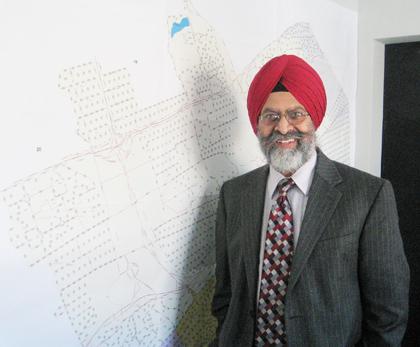
Photo by Howard Koplowitz.
Swaranjit Singh is running for New York City Council, representing Queens. An underdog in a new campaign for a new voting enclave, he’s running, in part, to ensure that “roti-eating people” have a voice, and a say, in New York’s politics:
“My biggest goal is to unite the roti-eating people. Only when we are united, that’s the way we can get any [political] positions,” Singh said… “We can make a difference…” [link]
He emphasized that he’s running to represent all people in the district, but that the desi population in the region is rapidly growing and that there’s a need for community participation and cultural understanding throughout government. At present, desis (mostly Sikh) represent roughly 34% of his district’s population.
Presidents’ Day in the U.S. is kind of a all-in-one holiday, you celebrate Lincoln and Washington’s birthdays while honoring all U.S. Presidents. Some just enjoy the day off too!
On this Presidents’ Day, C-SPAN commemorated the holiday by releasing the results of its 2009 Historians Presidential Leadership Survey (last time they did it was in 2000). Sixty-five historians chosen by C-SPAN and its academic advisors, ranked the last 42 American Presidents across 10 attributes of presidential leadership. These attributes ranged from “International Relations” and “Economic Management” to “Moral Authority” and “Public Persuasion”. There was also a category for “Performance Within Contexts Of Times” to account for the variation in issues encountered by each President.
A few days ago we covered the story of Lakhwinder Kahlon – a father who was sentenced to life for the murder of his two-year-old daughter in B.C., Canada. Along the same lines we are hearing news about Moninder Singh Pandher who today was convicted of murdering a young girl, the first verdict in a case involving the deaths of 19 people. Pandher and his servant Surinder Koli were arrested last year after body parts were found near their home in Delhi. Most of the victims were children who had dissapeared in the area in years prior. Pandher and Koli were charged with murder, rape and abduction.
Residents say as many as 40 children disappeared in the area over two years before the crime came to light in December 2006.
The killings horrified people in India and the businessman’s Noida home was dubbed the “house of horrors”. The remains of the children were found hidden in bags. [link]
The crime shocked the country and many blamed incompetent police. Local residents said police failed to act over the abductions and murders because many of those reported missing came from poor families. A BBC article discusses this in more detail,
